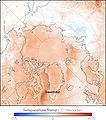Polar amplification
Polar amplification also referred to as Arctic amplification, is the greater temperature increases in the Arctic compared to the earth as a whole as a result of the effect of feedbacks and other processes[1] It is not observed in the Antarctic, largely because the Southern Ocean acts as a heat sink and the lack of seasonal snow cover.[2] It is common to see it stated that "Climate models generally predict amplified warming in polar regions", e.g. Doran et al.[3] However, climate models predict amplified warming for the Arctic but only modest warming for Antarctica.[2]
-
Arctic Temperature Trend 1987–2007
-
Antarctic Temperature Trend 1981–2007 (note: temperature scale differs considerably from the Arctic plot)
See also
References
- ^ Arctic Climate Impact Assessment - International Arctic Science Committee
- ^ a b "Antarctic cooling, global warming?". RealClimate. 3 December 2004.
- ^ Doran, Peter T.; Priscu, John C.; Lyons, W. Berry; Walsh, John E.; Fountain, Andrew G.; McKnight, Diane M.; Moorhead, DL; Virginia, RA; Wall, DH (31 January 2002). "Antarctic climate cooling and terrestrial ecosystem response". Nature. 415 (6871): 517–20. doi:10.1038/nature710. PMID 11793010.


